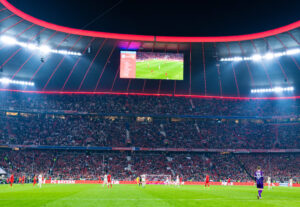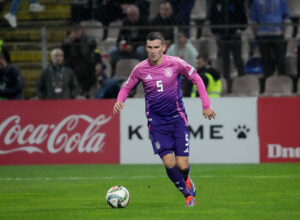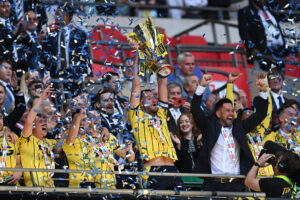When the highlight of a match is the overturning of the overturning of a goal, you know that it has not been a very good one, and so it was for Arsenal against Benfica in the first and nominally ‘away’ leg of their Europa League last 32 tie. Bukayo Saka’s equaliser after Benfica had gone ahead was initially ruled out for offside by the assistant referee, before being unruled out by the referee, rescuing a draw for Mikel Arteta and his side.
Arsenal had been so poor in front of goal all game, with even Pierre-Emerick Aubameyang missing what for him was a sitter, that it would not have been surprising if Saka’s goal had not stood. Eventually, however, it did and Arsenal at least go into the second and supposedly ‘home’ leg – which will actually take place in Athens next Thursday – level in the tie. However, it was still an underwhelming result and performance that unfortunately was typical of Arsenal’s underachievement in European competition, not just under Arteta in the last year or so but throughout the club’s entire history.
Mikel Arteta Continuing Arsenal’s Underachievement in Europe
Struggles in Europe for Mikel Arteta
The truth is that Arsenal are probably the biggest underachievers in European football – not just among English clubs but among all clubs in Europe. So far, in his relatively short period in charge at The Emirates, Mikel Arteta has been unable to do much to change that appalling record. Before the first lockdown began almost a year ago, Arsenal limped out of the Europa League against Olympiakos by losing miserably at home after winning away, with Aubameyang missing yet another sitter at the death. (Overall, the goalscoring record in European competition of the great Gabonese does not compare with his stunning domestic form in France, Germany and now England.)
This season, although Arsenal performed well in the Europa League in the group stage before Christmas – so well, in fact, that the stars of the ‘Youthropa’ squad, Bukayo Saka and Emile Smith Rowe, have now become first-team fixtures – the general meh-ness of the match against Benfica did not offer much hope of a significant upturn in the club’s European record under Arteta’s management.
Arsenal’s Historic Struggles in Europe: Part I (1930-1970)
However, Arsenal’s poor record in European football predates Arteta, and by a long way. Of course, when Arsenal were at their most dominant in English football, nearly a hundred years ago in the 1930s, there was no European club football, even though the club’s greatest ever manager, Herbert Chapman, actively sought it. Instead, Arsenal fans in that golden age in the club’s history had to content themselves with winning the World Cup. At least that was what many of them claimed Arsenal had done after the infamous Battle of Highbury in the autumn of 1934. Then, an England side featuring a record seven Arsenal players and playing at Arsenal’s home ground defeated the reigning World Champions, Italy, who had won the World Cup on home soil that summer after England had not even deigned to enter, so sure were they of their superiority over all other international teams.
Of course, when European club competition finally began in the 1950s, it coincided with the beginning of Arsenal’s long trophy drought, which lasted between 1953 and 1970. During that period, even if Arsenal qualified for Europe, it was only ever in the Fairs or Uefa Cup and not in the infinitely more glamorous European Cup or even the slightly more glamorous Cup Winners’ Cup. However, it was in European football that Arsenal finally ended their near two-decade wait for silverware in 1970, when they first beat Johan Cruyff’s Ajax side in the semi-final (just a year before Ajax would win the first of a hat-trick of European Cups) and Anderlecht in an incredible final. That final, like the ties that preceded it, was played over two legs, with Arsenal coming back from a 3-1 away deficit to win 3-0 at home and 4-3 on aggregate.
Arsenal’s Historic Struggles In Europe: Part II (1970 to the present)
However, although that first-ever European trophy win paved the way for the historic double triumph of 1971, it did not exactly open the floodgates to more European silverware. In more than half a century since, Arsenal have only ever won one more European trophy, the 1994 Cup Winners’ Cup. That was the last great success of the George Graham era – in fact, it was arguably the second greatest success of that period, after the spectacular 1989 League triumph at Anfield. That was because Graham’s Arsenal beat the Cup Winners’ Cup holders, Parma, in a one-off final in Copenhagen at the height of the Italian domination of European football.
Before and after that sole victory, however, there have been no fewer than five defeats for Arsenal in European finals: two in the Cup Winners’ Cup (in 1980 and 1995); two in the Uefa Cup/Europa League (2000 and 2019); and worst of all, of course, once in the Champions League Final in 2006. On that last occasion, Arsene Wenger’s final great side came within 15 minutes of winning the biggest prize in club football, despite playing most of the game with 10 men after goalkeeper Jens Lehmann was sent off early on, only to succumb at the death to the Barcelona of Ronaldinho and E’too.
The Worst European Record of All the Big English Clubs
Indeed, such has been Arsenal’s enduring troubles in European football that their record in European football as a whole is almost the worst of all the big English clubs, or at least those who are still generally regarded as ‘The Big Six’ (even though some of them, notably Arsenal themselves, have been nowhere near the top six in the Premier League for a while). Of course, Liverpool and Manchester United, the only two English teams to win more league titles than Arsenal’s 13, have won multiple European Cups/Champions Leagues apiece, without even taking into account the other European trophies (Cup Winners’ Cups and Uefa Cup/Europa Leagues) that they have also won.
However, even Arsenal’s major London rivals, Chelsea and Tottenham Hotspur, have fared better than them in Europe, with Roman Abramovich’s Chelsea finally winning the Champions League in 2012 and Tottenham winning three European trophies in total to Arsenal’s two. It is only Manchester City, who of course spent decades in the doldrums and even the lower divisions until the Abu Dhabi-backed takeover in 2008, who have fared worse than Arsenal in Europe, winning just one European trophy – the Cup Winners’ Cup – in 1970.
Why Have Arsenal Always Been So Bad in Europe?
It remains something of a mystery as to why England’s third most successful team domestically have always performed so badly in European competition. And the really big mystery is why Arsène Wenger’s great Arsenal sides, which were themselves packed with European players, should have consistently failed to perform well in the Champions League, or even the Uefa Cup/Europa League when they dropped into it. Perhaps it was simply because Dennis Bergkamp, the man who knitted together so many of those great sides, was often unavailable for away legs because of his fear of flying.
No Change So Far for Mikel Arteta
Of course, so far Mikel Arteta has been unable to turn around Arsenal’s record in European competition, after the loss against Olympiakos last season and the stalemate in the match against Benfica, who are the first serious opposition that Arsenal have faced in the Europa League this season. Ironically, Benfica might be the second biggest underachiever in European football, after Arsenal, given that they have now gone more than 60 years without winning any European trophy after ending Real Madrid’s stranglehold on the early European Cup (a feat that was beyond even the Busby Babes) when they won the tournament in 1961 and 1962. Benfica legend has it that the great manager of that side, the Hungarian Béla Guttmann, put a curse on the club when he left almost immediately after winning a second European Cup because the board refused to give him the pay rise that he so obviously deserved.
Are Arsenal Cursed Too?
Arsenal may not have had a curse put on them by a former manager (unless George Graham did so when he was fired in 1995 for financial irregularities), but they still appear to be cursed in Europe. Arteta will hope that, in time, he can transform the club’s fortunes in European competition. However, time is clearly in short supply, especially given the fact that there is a very real danger that Arsenal will not qualify for European football of any kind next season for the first time since 1995.
The problem that Arsenal face in the Europa League appears to be the same one that they face in the Premier League, namely that at this time there appear to be many better teams than them in the competition. Having stalled again in the two recent away defeats to Wolverhampton Wanderers and Aston Villa, and with the currently untouchable Manchester City coming to The Emirates on Sunday, it still appears incredibly unlikely that Arsenal can qualify for the Europa League, let alone the Champions League, through their Premier League placing. Similarly, this season’s Europa League really does look like a ‘Champions League B’, with so many fallen giants – including Manchester United, Tottenham, AC Milan, PSV Eindhoven, Napoli and Bayer Leverkusen – also in the competition.
Nevertheless, all hope is not lost yet. After losing four successive home games in the autumn, for the first time since the 1950s, Arsenal have been strong at home since Christmas and may yet be able to take at least a point off Manchester City. And in the Europa League, for all their struggles in the first leg against Benfica, they will still be favourites to progress to the last 16. The challenge for Mikel Arteta now, in both the Premier League and the Europa League, is the same one that has existed throughout his year in charge at Arsenal – to find some desperately needed consistency. Now would be the ideal time to find it. Otherwise, Arsenal face at least a season without any European football at all for the first time in nearly 30 years.
Main Photo






